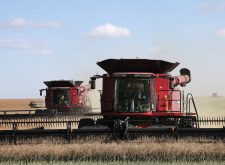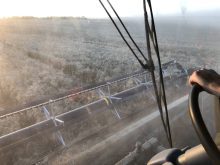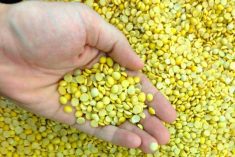The federal government is now officially canvassing the grains sector on upgrades to Canada’s grain regulatory system.
Agriculture Minister Marie-Claude Bibeau, speaking Tuesday to Saskatchewan crop organizations’ virtual CropSphere conference, announced the feds’ current Canada Grain Act review has entered its consultation stage, running until April 30.
The government said it wants feedback from grain industry stakeholders on “ways to potentially update the legislation.”
Read Also

New Syngenta fungicide targets anthracnose, white mould, Ascochyta blight
Lentil growers in Canada have a new option for controlling three major disease threats to the crop.
Both the Canada Grain Act and its main regulatory body, the Canadian Grain Commission, were “established at a time when the Canadian grain sector looked much different than it does today,” the government said in its discussion document.
“The way grain is bought, sold, delivered and handled at facilities has changed significantly, as have buyers’ demands for grain quality… (and) it is possible that some modernization is required to ensure the system is better aligned with current and future market realities.”
Apart from some “targeted” changes, the government said, the last “comprehensive” amendments to the Act came in 1971, since which time several reforms have been proposed.
Also, the feds noted, the CGC has been working on a “grain grading modernization initiative” since 2017, “to ensure that, where possible, grain grading is continually evaluated using more scientifically-based, effective, precise and user-friendly tools.”
“The marketplace for grain has greatly evolved over the past half century, and now is the time for the Canada Grain Act to reflect that evolution,” Winnipeg MP Jim Carr, who was named Tuesday as the federal cabinet’s special representative for the Prairies, said in Bibeau’s release.
“I encourage all those with a stake in Canada’s grain industry to make their voices heard as part of this consultation.”
The consultations’ discussion document flags issues the government said “may be of particular interest” to the sector, such as:
- binding determination, which is meant to be an “independent dispute resolution mechanism” when a grower and buyer disagree on a grain’s grade or level of dockage;
- producer payment protection, the CGC-led program “to help ensure producers are protected against a buyer’s failure to pay for grain, in a cost-effective manner that fairly allocates risk;”
- the CGC’s licensing system for elevators and grain dealers, meant to maintain Canada’s grain quality assurance system, serve as a safeguard for producers and allow for collection of grain data; and
- Canada’s system of inspection, weighing and certification of grain for export.
In those cases, the government asks in its discussion documents if there are ways in which those systems and programs “could better meet the sector’s needs.”
The list of flagged issues is “not a comprehensive list of Canadian Grain Commission functions,” the government said, but is meant to highlight “practical areas that may be of interest to stakeholders.”
In the past decade alone, the government said, Canadian grain production has risen from 69 million tonnes in 2010 to 93 million in 2020, and exports from CGC-licensed elevators rose from 30.8 million tonnes in 2009-10 to 44.3 million in 2019-20.
The grains sector has also made “significant infrastructure investments” in recent years, such as in rail and port infrastructure, and has also boosted the Prairies’ primary elevator storage capacity.
“Structural changes have also affected the sector, such as reforms in wheat and barley marketing,” the government said.
Also, “technological advancements and evolving grain buyer demands also continue to shape the sector and its capacity as one of the world’s leading exporters of grain.” — Glacier FarmMedia Network
















